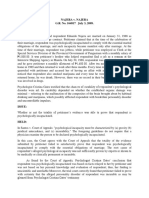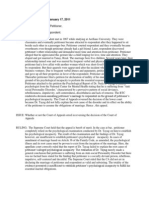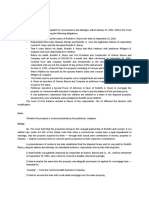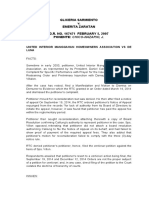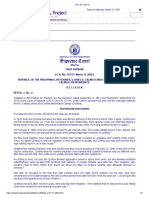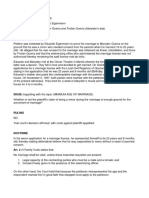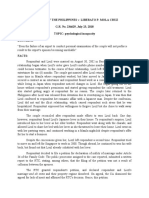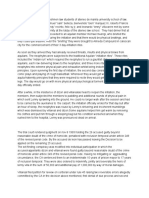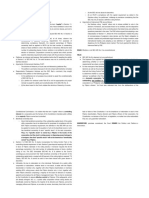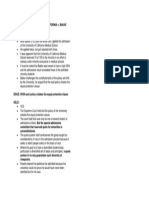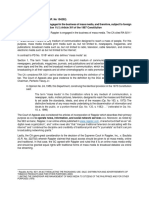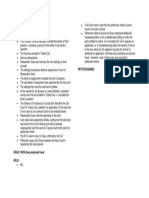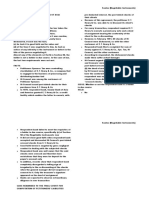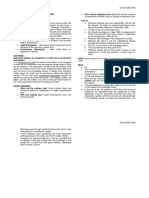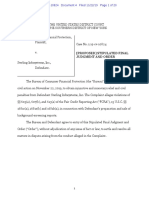Najera V Najera
Najera V Najera
Uploaded by
RenzoSantosCopyright:
Available Formats
Najera V Najera
Najera V Najera
Uploaded by
RenzoSantosOriginal Description:
Original Title
Copyright
Available Formats
Share this document
Did you find this document useful?
Is this content inappropriate?
Copyright:
Available Formats
Najera V Najera
Najera V Najera
Uploaded by
RenzoSantosCopyright:
Available Formats
NAJERA v.
NAJERA
Topic: Psychological Incapacity; Article 36
FACTS:
Petitioner Digna Najera and respondent Eduardo Najera got married on January 31 1988. They
were childless.
Petitioner claimed that at the time of the celebration of marriage, respondent was psychologically
incapacitated to comply with the essential marital obligations of the marriage, and such incapacity
became manifest only after marriage as shown by the following facts:
o Respondent didnt bother looking for a job, only relied on petitioners elder brother in
landing a job as a seaman
o While working as a seaman, respondent did not give petitioner sufficient financial support
o Every time he goes home for vacation, he quarrels petitioner
o Respondent was always drinking and started smoking marijuana. He also forced her to
smoke marijuana but petitioner refused
o Accused petitioner of having an affair and started to threaten her
o Respondent left the conjugal home and took all his personal belongings. He moved to the
United States.
Petitioner filed, among other things, for the court to declare their marriage void ab initio
Petitioner provided evidence supporting her claim. One of the witnesses was Cristina Gates, a
psychologist.
According to Gates, respondents psychological incapacity and personality disorder is incurable,
despite the fact that she has never personally examined the respondent. She relied on the reports
of petitioner herein.
RTC: Denied the petition for annulment (court granted only legal separation)
CA: Affirmed the decision of the CA
ISSUE: Whether or not the totality of petitioners evidence would suffice the necessary requirements for
annulment of marriage pursuant to Article 36 of the Family Code
HELD:
NO
The Court herein ruled that for psychological incapacity to be appreciated and therefore grant the
annulment of marriage, 3 requisites must concur: (1) gravity (2) juridical antecedence (c)
incurability.
The root cause may be medically or clinically identified. What is important is the presence of
evidence that can adequately establish the partys psychological condition.
In the case at bar, the evidence provided by petitioner Digna did not impress the Court.
The testimony provided by Cristina Gates was not enough to convince the Court that respondent
Eduardo was psychologically incapacitated
Gates conclusion that respondent Eduardo was psychologically incapacitated only relied on the
facts relayed by petitioner Digna. Gates did not personally examined the respondent herein, as
evidenced by the stenographic report.
PETITION DENIED
You might also like
- Written Address in Support of Motion For Extension of Time100% (3)Written Address in Support of Motion For Extension of Time4 pages
- Najera V. Najera G.R. No. 164817 July 3, 2009. FactsNo ratings yetNajera V. Najera G.R. No. 164817 July 3, 2009. Facts1 page
- Agraviador vs. Agraviador & Mendoza vs. RepublicNo ratings yetAgraviador vs. Agraviador & Mendoza vs. Republic3 pages
- 204 SCRA 20 (310 Phil. 21) - Santos v. CANo ratings yet204 SCRA 20 (310 Phil. 21) - Santos v. CA2 pages
- Aurelio v. Aurelio, G.R. No. 175367, June 6, 2011No ratings yetAurelio v. Aurelio, G.R. No. 175367, June 6, 20112 pages
- Palma and Mercado v. Judge Omelio, A.M. No. RTJ-10-2223 Aug. 30, 2017No ratings yetPalma and Mercado v. Judge Omelio, A.M. No. RTJ-10-2223 Aug. 30, 20174 pages
- Rodrigo v. Sandiganbayan, G.R. No. 125498, February 18, 1999No ratings yetRodrigo v. Sandiganbayan, G.R. No. 125498, February 18, 19991 page
- Office of The Court Administrator vs. Hon. Genaro C. Gines A.M. No. RTJ-92-802, July 5, 1993 FactsNo ratings yetOffice of The Court Administrator vs. Hon. Genaro C. Gines A.M. No. RTJ-92-802, July 5, 1993 Facts1 page
- Gliceria Sarmiento v. Emerita Zaratan G.R. NO. 167471 FEBRUARY 5, 2007 Ponente: Chico-Nazario, JNo ratings yetGliceria Sarmiento v. Emerita Zaratan G.R. NO. 167471 FEBRUARY 5, 2007 Ponente: Chico-Nazario, J3 pages
- Kalaw vs. Fernandez Case Digest By: Andrea Isabel Concepcion Legal Basis/Doctrine: Article 36 of The Family CodeNo ratings yetKalaw vs. Fernandez Case Digest By: Andrea Isabel Concepcion Legal Basis/Doctrine: Article 36 of The Family Code2 pages
- REMO vs. DFA (G.R. No. 169202) 5 March 2010 On Use of SurnamesNo ratings yetREMO vs. DFA (G.R. No. 169202) 5 March 2010 On Use of Surnames1 page
- Case #17 Eigenmann Vs Guerra 5 CA Rep 836 (1964) MergedNo ratings yetCase #17 Eigenmann Vs Guerra 5 CA Rep 836 (1964) Merged3 pages
- Article 15, Status and Condition, Pilapil v. Ibay-SomeraNo ratings yetArticle 15, Status and Condition, Pilapil v. Ibay-Somera1 page
- Chi Ming Tsoi vs. CA and Gina Lao Tsoi, G.R. No. 119190No ratings yetChi Ming Tsoi vs. CA and Gina Lao Tsoi, G.R. No. 1191902 pages
- MARIA QUINTANA, Plaintiff-Appellee, GELASIO LERMA, Defendant-Appellant. G.R. No. L-7426 February 5, 1913No ratings yetMARIA QUINTANA, Plaintiff-Appellee, GELASIO LERMA, Defendant-Appellant. G.R. No. L-7426 February 5, 19131 page
- Republic of The Philippines V. Liberato P. Mola Cruz G.R. No. 236629, July 23, 2018 TOPIC: Psychological Incapacity DoctrineNo ratings yetRepublic of The Philippines V. Liberato P. Mola Cruz G.R. No. 236629, July 23, 2018 TOPIC: Psychological Incapacity Doctrine4 pages
- Calma v. Santos-Calma, G.R. No. 242070 CASE DIGESTNo ratings yetCalma v. Santos-Calma, G.R. No. 242070 CASE DIGEST2 pages
- CASE DIGEST #4 Legal Ethics (Dumanlag-Vs-Atty - Intong) 2-sNo ratings yetCASE DIGEST #4 Legal Ethics (Dumanlag-Vs-Atty - Intong) 2-s7 pages
- in The Matter of The Petition For Disbarment of Telesforo A. Diao, Bengzon, C.J.No ratings yetin The Matter of The Petition For Disbarment of Telesforo A. Diao, Bengzon, C.J.1 page
- Regents of The University of California v. BakkeNo ratings yetRegents of The University of California v. Bakke1 page
- (Labor 2 - Atty. Nolasco) : G.R. No. 166208 June 29, 2007 Velasco, JR., J. Digest By: Santos100% (1)(Labor 2 - Atty. Nolasco) : G.R. No. 166208 June 29, 2007 Velasco, JR., J. Digest By: Santos2 pages
- Uy Hu & Co. v. The Prudential Assurance Co., LTD100% (1)Uy Hu & Co. v. The Prudential Assurance Co., LTD1 page
- Topic: Common Carriers Contract of Transportation Ancillary ContractsNo ratings yetTopic: Common Carriers Contract of Transportation Ancillary Contracts1 page
- Pioneer Insurance Surety Corporation v. Morning Star Et. Al100% (2)Pioneer Insurance Surety Corporation v. Morning Star Et. Al1 page
- Lavadia v. Heirs of Luna, GR No. 171419 (SANTOS)100% (3)Lavadia v. Heirs of Luna, GR No. 171419 (SANTOS)1 page
- Topic: The Corporation and The State: Sbma V. UigNo ratings yetTopic: The Corporation and The State: Sbma V. Uig1 page
- Topic: Voidable Marriages Insanity: Katipunan V. TenorioNo ratings yetTopic: Voidable Marriages Insanity: Katipunan V. Tenorio1 page
- Topic: Voidable Marriages Insanity: Katipunan V. TenorioNo ratings yetTopic: Voidable Marriages Insanity: Katipunan V. Tenorio1 page
- (SANTOS) Ledonio v. Capitol Development Corporation100% (2)(SANTOS) Ledonio v. Capitol Development Corporation2 pages
- Northwest Airlines Inc. v. Del - RosarioNo ratings yetNorthwest Airlines Inc. v. Del - Rosario6 pages
- Bourne v. State of Kansas Et Al - Document No. 2No ratings yetBourne v. State of Kansas Et Al - Document No. 22 pages
- Professional Practice For Architects: Lecture No. 8: Course Instructor: Ar./Plnr. Azhar M. SualehiNo ratings yetProfessional Practice For Architects: Lecture No. 8: Course Instructor: Ar./Plnr. Azhar M. Sualehi5 pages
- Common Law Ethical Duties of A Legal PractitionerNo ratings yetCommon Law Ethical Duties of A Legal Practitioner31 pages
- Bradshaw Medical v. MedTorque - Second Amended ComplaintNo ratings yetBradshaw Medical v. MedTorque - Second Amended Complaint61 pages
- Saule v. FXR Factory Racing - ComplaintNo ratings yetSaule v. FXR Factory Racing - Complaint187 pages
- Truvada-B&b 85 15 (B&B Contract) - EncryptedNo ratings yetTruvada-B&b 85 15 (B&B Contract) - Encrypted13 pages
- (Proposed) Stipulated Final Judgment and OrderNo ratings yet(Proposed) Stipulated Final Judgment and Order20 pages
- Lifefactory v. Leapfrog Product DevelopmentNo ratings yetLifefactory v. Leapfrog Product Development4 pages
- Pagbabago Program - Land For The Landless Acquisition Under Torrens System Real Property Act 185850% (2)Pagbabago Program - Land For The Landless Acquisition Under Torrens System Real Property Act 18583 pages
- United States v. Garcia, 10th Cir. (1999)No ratings yetUnited States v. Garcia, 10th Cir. (1999)5 pages
- Cajucom, VII vs. TPI Phils. Cement Corporation, Et Al., G.R. No. 149090, February 11, 2005No ratings yetCajucom, VII vs. TPI Phils. Cement Corporation, Et Al., G.R. No. 149090, February 11, 200512 pages
- Tan Boon Bee & Co., Inc. v. Jarencio, G.R. No. L-41337, 30 Jun 1988No ratings yetTan Boon Bee & Co., Inc. v. Jarencio, G.R. No. L-41337, 30 Jun 19884 pages
- Joseph Angelo Dicesare v. Larry D. Stuart Rene P. Henry, Jr. The County of Osage County, Oklahoma Three Unknown County Commissioners Unknown Sheriff & Deputies of the Osage County Sheriff's Department Stanley Glanz, Sheriff of Tulsa County Bill O'dell, Deputy Sheriff of Tulsa County, 82 F.3d 425, 10th Cir. (1996)No ratings yetJoseph Angelo Dicesare v. Larry D. Stuart Rene P. Henry, Jr. The County of Osage County, Oklahoma Three Unknown County Commissioners Unknown Sheriff & Deputies of the Osage County Sheriff's Department Stanley Glanz, Sheriff of Tulsa County Bill O'dell, Deputy Sheriff of Tulsa County, 82 F.3d 425, 10th Cir. (1996)3 pages


